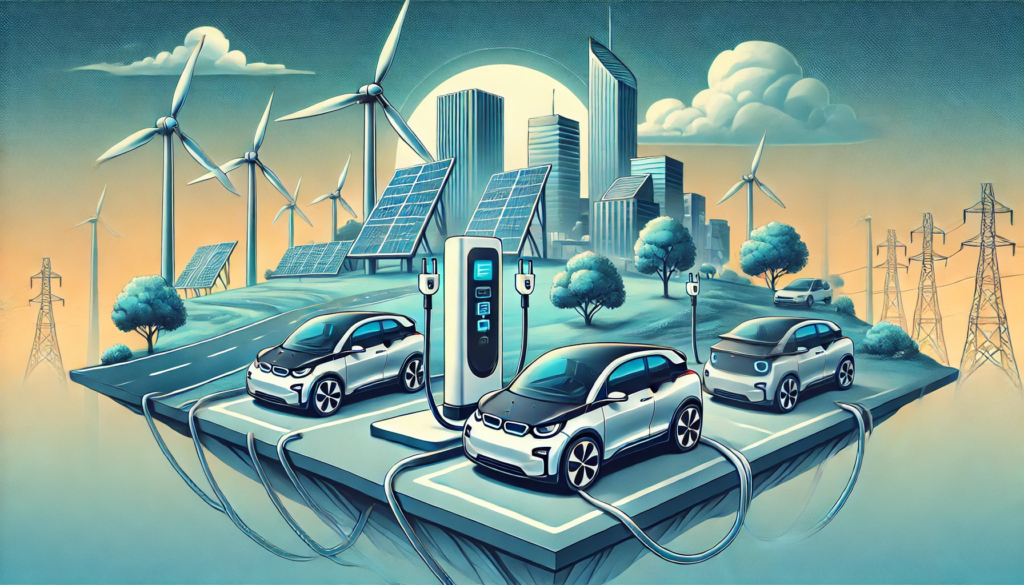
A Revolution on Wheels
The automotive industry is undergoing one of its most significant transformations in history: the shift to electric vehicles (EVs). No longer a distant vision, EVs are rapidly gaining popularity as consumers, automakers, and governments seek sustainable alternatives to combat climate change and reduce urban air pollution. This surge toward electric mobility marks not just a change in technology but a global movement toward a cleaner, greener future of transportation.
Why Are Electric Vehicles Gaining Momentum?
The rise of electric vehicles has been meteoric. In 2023, global sales exceeded 10 million units, a clear sign that EVs are no longer niche products but mainstream contenders. So, what’s driving this rapid adoption?
A perfect storm of factors is at play. Advances in battery technology have extended the driving range of EVs, addressing one of the major early concerns about their practicality. Meanwhile, government incentives such as tax breaks and subsidies make EVs more affordable for everyday consumers. Countries like Norway, China, and the United States are leading the charge by investing heavily in charging infrastructure and offering incentives to promote green transportation. Major automakers, from Tesla to Volkswagen, have embraced the electric revolution, unveiling sleek new models that promise better performance, faster charging, and more affordability.
The Power of Going Electric
One of the most compelling reasons behind the rise of EVs is their environmental impact. Unlike traditional gasoline-powered vehicles, electric cars produce zero tailpipe emissions, contributing to cleaner air and healthier cities. In a world increasingly concerned about climate change, the shift to electric transportation offers a significant reduction in greenhouse gases.
But the benefits go beyond the environment. Electric vehicles are more energy-efficient than their gas-guzzling counterparts. Electric motors convert more energy into actual movement, reducing wasted energy and lowering operational costs for drivers. Charging an EV is often far cheaper than filling a tank with gasoline, meaning that over time, EV owners can save significantly on fuel costs.
Overcoming the Roadblocks
Despite their promise, electric vehicles face several key challenges that could slow their widespread adoption. One of the most significant hurdles is the availability of charging stations. While urban areas are increasingly well-equipped with charging infrastructure, many rural regions lag behind, making long-distance travel in EVs more difficult. However, the world is catching up countries like the U.S. and U.K. have committed to expanding fast-charging networks, ensuring that EV drivers can travel without worrying about running out of power.
Another concern is battery technology. While significant progress has been made, with some EVs offering ranges of over 300 miles on a single charge, batteries still degrade over time, and production costs remain high. However, researchers are making strides in developing solid-state batteries, which could revolutionize the industry by offering faster charging, greater energy density, and longer battery life.
The Road Ahead: A Bright Future for EVs
Looking to the future, the electric vehicle market is poised for even more rapid growth. Governments around the world are rolling out ambitious plans to phase out internal combustion engine vehicles. The U.K. and France, for example, have set targets to ban the sale of new gasoline and diesel cars by 2035. This is pushing automakers to accelerate their transition to electric models.
Automakers themselves are investing billions in EV technology, with companies like Ford, General Motors, and Volkswagen all making major commitments to electrifying their fleets. These investments promise to lower the cost of electric cars, making them more accessible to a broader range of consumers. Coupled with advancements in battery technology and autonomous driving features, the electric vehicles of tomorrow will be smarter, more affordable, and more efficient than ever before.
Driving Toward a Greener Future
The shift to electric vehicles isn’t just a trend it’s a revolution in how we think about transportation. EVs offer a cleaner, more sustainable alternative to traditional cars, with benefits that range from environmental impact to cost savings for consumers. While there are still challenges to overcome, such as building a robust charging infrastructure and refining battery technology, the future of electric mobility is clear.
As the world continues to embrace greener technologies, electric vehicles will play a pivotal role in shaping the future of transportation and addressing the urgent need to combat climate change. The journey toward an all-electric future has begun, and the road ahead is full of promise.


